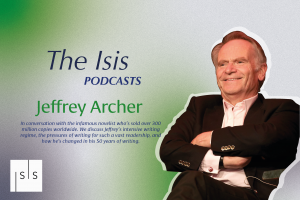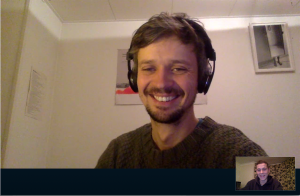‘Gay night out and then a kebab!’ In Conversation With: Stephen Bailey
by Innayat Brar | February 27, 2024

The first thing you notice about speaking to Stephen Bailey is how the conversation immediately settles itself into a startlingly familiar and comfortable shape; the feeling of sinking into dialogue as if onto a plush velvet couch. If you forget yourself for just a moment, you may be laughing at a caustic joke made by a sharp-witted colleague, rather than a veritable comedian performing in sold-out tours nationwide. Stephen accords me the same respect and attention in the hour and twenty minutes I spend on the phone with him as he does to sold-out theatres. It is in this integrity in his dealings with people that his craft first came to fruition a decade ago. His first show was in ‘a tiny room in front of a pub,’ with about thirty people, including no doubt his housemate, and which he describes as ‘being really fun!’ In recalling his formal induction into the comedy scene, he identifies a ‘young naivety’ that was infectious amongst his social group, reminiscing over this time when ‘people still went out and had a drink!’
What then about today? Have we lost this ‘young naivety’ as a society? This social, and indeed natural, impulse to revel in a laughter that pours out over and extinguishes, however temporarily, the ugliness of anxiety, isolation, conflict. When asked about his comedic style, Stephen reveals that he tries to ‘keep it light and playful, just sort of figuring it out! The world was playful! And [at 20 years old he] was playful!’ In contrast, the world of my twenties is more aptly characterised by a ‘heaviness’ that pervades the way we think, feel, and laugh: ‘everyone’s so aggressive, [on a] short fuse!’, supplying the cost-of-living crisis as one such burden we shoulder today. If comedy’s chief aim is to ‘make people laugh,’ as Stephen emphatically asserts throughout the interview, does that mean it can absolve itself from responding to the things in our lives that are distinctly uncomedic, such as social iniquity? Here, he answers that ‘the news is everywhere! Comedy can actually be a safe haven, [allowing one to] shut the door on everything that’s happening with our gas bills.’ Stephen’s conception of comedy as a ‘haven,’ a safeguard against the ‘heaviness’ that greets us outside the door, is perhaps the kindest and most thoughtful way I have ever heard of a performer describe their craft. His responsibility is not only to himself and the material, but to further protect the sanctity of a space where people quite simply feel comfortable. While he does consider the merits of being more politically outspoken over the years (citing Brexit as an example of something he could have vocalised more frequently), Stephen ultimately uses his voice to honour the people who see him perform, by simply ‘making them laugh’.
There is, I soon found out, nothing simple about his craft at all. Stephen is acutely aware of the need to adapt his material to a changing audience and indeed a social landscape very different from that of his Northern upbringing. He recalls working at the supermarket and studying at university, the simultaneous experience of which allowed him to ‘inhabit different worlds’ and thus ‘never feel alone or isolated!’ However, this investment in community and others seems to be truncated by both the pandemic and the ubiquity of social media. Not only are we more ‘alone and isolated,’ but our interactions have become ‘less human.’ Instead of getting a drink at a pub with your housemates, as Stephen did after his first comedy show, people are more likely to be ‘too busy,’ even though ‘we have so much more access!’
How, then, is a comedian whose style of connectivity hinges upon relatability and anecdotes, appeal to a disconnected audience? If my conversation with him thus far has revealed anything, it is perhaps that this style of storytelling is precisely what we need. More than being simply appealing, it is also impactful. When working on his material, he is governed by two chief maxims: ‘is this fun, and is this funny?’ Initially, it seems as though the first question is in service to himself, and the second for his audience. However, it seems as though the stories Stephen enjoys telling best – ‘the fun’ – is directed by the receptiveness of the audience to them – ‘the funny.’ The audience itself acts as a contributor to the show – a Stephen Bailey show is a fundamentally symbiotic event. His audience is never the passive receptacle upon which funny-ness is deposited. This community-minded comedy is not just a costume one can just put on and leave behind on the stage, but something that I find to be intrinsic to Stephen’s view of life and of people. Indeed, he says that wants his show to feel like a ‘gay night out and then a kebab!’ (When asked what club he’d recommend to those who want to emulate the sensation of having been at his show but unfortunately couldn’t buy tickets before they sold out in Oxford, he directs me to ‘New York New York’ in Manchester.)
With Stephen’s comedic style being so community-minded, the conversation naturally then takes recourse to the community that he grew up in. I’ve noticed that his sexuality and working-class Northern roots often headline reviews and articles about him in the media, lending emphasis to difference. What does he choose to do with that characterisation? He mentions using ‘humour as a defence mechanism’ after growing up under section 28’ (a law that prohibits talking about homosexuality.’ He explains how growing up, he was ‘used to art being [made by] straight, white, middle-class people,’ and that anything ‘else is shocking.’ This final statement is particularly resonant for all those who have experienced otherness in a way which contested their very existence. Although there is nothing innately shocking about Stephen’s sexuality or upbringing, it is used consistently as an identifier in the media, presupposing something of an inevitability between the ‘else’ of his existence and the ‘shock’ of his work. Stephen himself has never referred to his own comedic style as a form of ‘gay comedy,’ but rather relates anecdotes and experiences from his life which have then sometimes, unfortunately, been distilled into reductive stereotypes. An idea I was interested in exploring with him was ‘camp.’ While he does consider himself to be ‘camp’ in terms of personality and flair, it is not in a way that is attributable to sexuality. For him, camp is just ‘a more confident and enhanced version of myself on stage!’ He then opines that there should be more attention directed towards the fact that he has a black belt: ‘I’m confident because … I can protect myself!’
It is clear from this conversation that his primary concerns as a performer reside in respect, with him stating that ‘I respect people’s money, because I didn’t grow up with money.’ He continues, ‘When I worked at the supermarket, I thought the customer was the most important thing … doing standup is an extension of my checkout job.’ The only agenda Stephen appears to follow is serving his community, enabling him to create an intimate, colloquial connection with his audience: ‘Most of my friendships are based in laughter … funny stories unite us more than anything else.’ Perhaps a remedy for the disconnection and heaviness that can at times seem to shape our society today, is merely in seeking out that laughter – whether that be with friends or in a comedy room. The conversation I had with Stephen did not follow a mechanical pattern of question and answer, but a rather more dynamic track of two people connecting, contributing equally and most importantly, and indeed facilitated by, a whole lot of laughter. Maybe the stage is a familial space, where performer and audience intermingle to create something powerful by the mere accident of having a good time together. Should Stephen choose to define his comedy as ‘political’ in the future, his capacity for generating light-heartedness in the face of disconnect and worry might be the most convincing testament to his impact.∎
Stephen Bailey will be taking his brand new live show, CRASS, to Oxford’s very own Old Fire Station on the 29th of February. Grab your tickets from the link below:
https://oldfirestation.org.uk/whats-on/stephen-bailey-crass/
Words by Innayat Brar.




